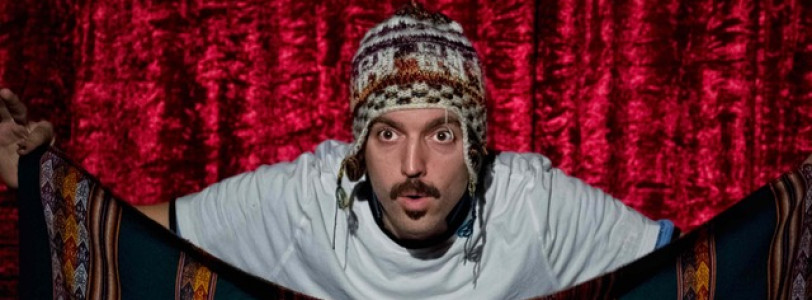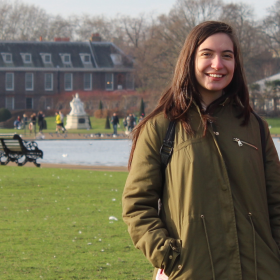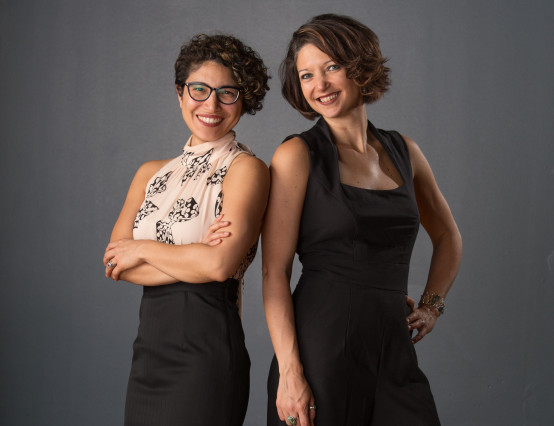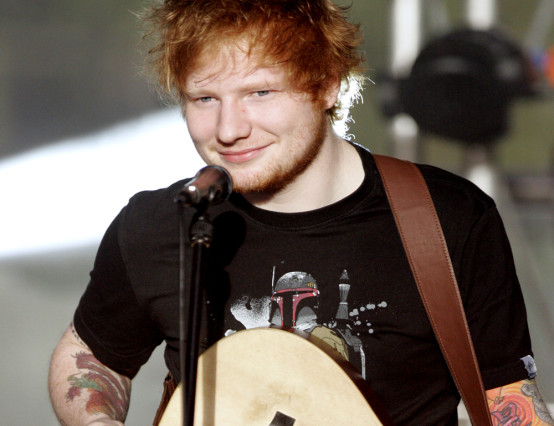Playing Latinx is the latest collaboration between Mariana Aristizabal Pardo and Malena Arucci from MarianaMalena Theatre Co, and Guido García Lueches. The play explores the stereotypes of the Latinx community in the UK – and the world – and how far we go to fit in. A one-person show alternating satire and comedy with moments of deep questioning, vulnerability, and introspection, Playing Latinx is a show that invites the audience to take part, reflect and have a laugh.
Hi Guido! It's great to talk with you, I'm very excited about this interview. Can you introduce yourself to our readers?
My name is Guido García Lueches, I’m a Uruguayan actor and theatre maker. I’ve been living in London for the past seven or eight years, and I just finished the run of Playing Latinx at Camden's People Theatre.
What was your first contact with the theatre?
Oof! I started in the theatre at the age of maybe five, six, seven (?) at school. We used to do plays at school, and I’ve always loved it. It was always something that drew me to do it. I took part in small school musicals when I was, say, six or seven? I remember they were doing “The Sound of Music”, and they had different casts for different scenes. For one of the scenes, one very good friend of mine was cast as one of the kids, one of the small Von Trapp kids, and he broke his leg. They didn’t know if he was going to be able to be in the show or not and I got cast as his understudy essentially. And he eventually came to school with a cast and said, “I still want to be in the show with the cast”. I think they didn’t have the heart to fire a seven-year-old me. So, in that one scene, there were eight Von Trapp children out there, instead of seven! And I never looked back.
Your career began in Uruguay, can you tell us a little more about that time?
Sí. I went to acting school in Uruguay right after high school. I went to the Instituto de Arte y Cine de Montevideo. I did a couple of years of acting school there and I started working. I was working with an improv group called Impronta Teatro, and I was also doing a lot of plays for kids. I was with a company where we used to [perform] plays in English to schools, like educational drama. I worked in that environment for five or six years, and at one point I came over to do a semester abroad in Leeds while I was at university. After drama school I went to university while working as an actor. It was a very strange combination. I kind of fell in love with this country, went back to Uruguay and then, at some point, decided to move permanently – and I’ve been here ever since!
What motivated you to move from Uruguay to London?
Many things. I think I needed some kind of change and the professional theatre scene in Uruguay felt relatively limited, I guess – in terms of being able to make a living out of it and that kind of thing. And as much as it also was quite limited when I first arrived here, now I am kind of making a living out of being a theatre maker in London and I’m not sure I would have been able to back home.
How has your experience been as an artist, immigrant, and Latin American in the UK so far?
I mean, I use this show to rant and to complain about a lot of the injustices I have faced, or I feel that I constantly come up against. But I do love it here. There’s a reason I’m still here and [why] I stay in this country. As much as I like to complain –about the government and all those things – London is such a cosmopolitan city and there’s so much going on if you know [where] to look for them. And what kept me sane and going was finding a community. Finding the Latino theatre community and the immigrant creative community, which is huge, and I’ve made very good friends with a lot of people. I came here without really knowing anyone. You make your own family and find your own people, and even the people I have collaborated with to do the show, for example, they’re all Latin American theatre makers that I’ve met during my time here.
Being from the River Plate region, do you consider that your works are influenced by River Plate music and theatre?
Definitely. 100%. There are several things, in fact. I think that a big sense of my politics comes from the Montevideo theatre politics, that I feel is very strong and is always on the forefront of trying to reclaim things. As it was in the post-dictatorship years as well: the theatre was always a highly political place, and I think I bring that with me. There’s definitely something in the music, and not just music like the tango, cumbia, or carnaval rhythms, but the poetry of it. I feel like Lorca is, for example, a big influence in the River Plate collective imagination. And I have brought a bit of that as well, which is interesting because England has its very own specific, poetic collective imagination, with Shakespeare and all that. But it comes from a different place; it almost comes from a different place in the body as well? There’s a very specific emphasis in this country about the text and the words. I feel that maybe we come from a place where the emphasis is a bit more energetic, on what makes you vibrate, perhaps.
What projection do you think Latin American art has in Europe? In general, is it well received by the public?
I can’t speak for Europe as a whole because I’m sure it’s different in Spain, for example, where it’s probably a lot more prominent. I don’t think it has a lot of reception here. We don’t get a lot of Latin American content coming over, to be honest. Now you’ll see it a bit more on Netflix, I think. There’s a festival in London about Latin American theatre every couple of years, but I’m not sure a greater community sees it at all. I think we all know we are here, and we exist, and we try to make as much noise as we can, but I’m still not sure how much we’re seen. I think that, for a lot of people, Latin America still feels quite far away.
How did you come up with the idea of bringing part of the Latin American idiosyncrasy to Europe, and putting it on stage?
It develops from my own personal journey as an actor here. I arrived in England thinking I was going to do Shakespeare plays, musicals, or whatever it is I thought I was going to do. And very quickly, I started to get asked to do all these very stereotypical Latino parts, to the point where I had to learn how to put on a very recognizable Latin accent. I trained myself to put it on and to figure out what was funny about it, how to make it sound how I thought people wanted it to sound, and even energetically, become a stereotypical person. I’ve been seen for so many thug Narco roles, or sexy Latino roles, all those things. It legitimately comes from a place where it’s like, “okay, if this is my way into this industry in this country, then, fine. I’ll figure it out and do it”. It kind of worked. I started getting hired to do a bunch of things. So, the play comes from an amalgamation of whatever this experience is, and very harsh reality; but hopefully in a way that’s hilarious as well. It’s funny in a sad way because it’s true. Even though it’s very specific about my experience and the Latin American experience, we’ve had audiences from all over the world saying how much they could recognise that. It kind of speaks to any immigrant experience, I hope. Even to someone who feels they might be different, or they have been treated as being different. There’s a sense of adaptability and what you change in yourself to make yourself a bit more comfortable.
Playing Latinx is your third collaboration with the MarianaMalena theatre company, how did this association start?
I think I met Mariana through the hashtag #OVConnect on Twitter very randomly. Very quickly, we realised we had a bunch of people in common; Malena and Mariana have known each other for years and have been working together for years. We just kind of hit it off. After having met and having had a chat about our work, I directed Mariana in a play she was doing with another friend of ours. I then asked them to come on board for this, and we were doing other things at the same time, with other writers and other teams. But it grew very organically; we met in a very professional environment, but very quickly became friends, and now it’s like, “I’ve got these poems, let’s try to do something about them”. It kind of grew like that, we wanted to hang out with each other.
This is your first one-person show, can you tell us a little about the creation process of the play?
It was long. We started off with the poems that I had written and thinking about them in the context of the silliest and weirdest auditions we could possibly think of. For example, the inflatable pool idea sparked at the very beginning when we started thinking about this play. And then we programmed it for March 2020, and it was a very different concept by then. I was going to sit with the audience and have some mate* and figure some things out, but it wasn't quite what it ended up becoming. Then we actually got in a room, the three of us, to devise it and to try things out. We had millions of ideas on the table. We knew we wanted to play with the audience. That was always the guiding principle for us. It was going to be a one-person show, but I didn’t want to be alone on stage – no one wants that. Audience interaction was always a guiding light, and silliness was a big one too. We were always asking ourselves, “what’s the stupidest version of this scene that we can possibly think of?”, and that’s how some things like asking the audience to teach me a dance move happened. We could have choreographed it, I could have learned a very good dance, and it could have been impressive; but it was a lot less stupid than asking someone who doesn’t expect it to teach me dance moves.
*Mate: Traditional South American infused drink made by soaking dried leaves (yerba mate) in hot water. It is served in a container made typically from calabash gourd, and a metal straw.
Do you consider that interacting with the public was an enriching experience?
For sure, yes. So much because the show tries to explore that line between being funny and being very serious, and very political. Every night is a little different depending on how the crowd is feeling, and how receptive they are to certain things. Some crowds laugh so, so much; but some other crowds get very quickly that you’re actually talking about quite serious sh*t, and you can tell that they laugh but they’re uncomfortable. It’s quite nice to navigate that. Every night is a conversation with the audience, really. And we kind of figure our way to the end together. That’s always interesting.
The play alternates very funny moments and moments of great tension with very deep reflections. Was it difficult to articulate these contrasting moments? How did you work on this aspect?
I think the challenge was figuring out how much we could push it, because the very serious monologue, the “angry monologue'', as I call it, the peak of the tension where everyone gets that it’s not a joke anymore, that came in just before we tried it with an audience last year. And I mean “just”, maybe a day before. I remember Malena was fighting to have that in. We didn’t want to just stay on the level of the satire. I think there was a need for us to make it very clear where we stood and to let everyone know exactly what our intentions were. I don’t think I could do an hour of ranting at an audience about all the bullsh*t that happens in the world – that would be boring. But just to stay on the level of being funny and not actually say a few of those things would have been a bit of a cop-out as well. There’s a little joke that we all love about Churchill. They’re saying things and they’re not relative to anything and I go, “well, you know, history’s relative. The English still think that Churchill was a war hero.” and literally the whole crowd just gasps. And that’s when we knew we needed to be in that place. Like, “how much is he actually going to say?”. You want a bit of that nervousness, I think.
What do you think is the reason for the Latinx stereotype? Is it due to history, climate, ethnic multi plurality, origins, etc?
Oof, who am I to answer that question?! I don’t know what the reason is. Ignorance, probably. That’s probably the root of most stereotypes. I think that the Latin American community in the UK in particular is quite invisible – it doesn’t get the media representation that other communities get. As much as there has been a Latin American community in the UK for a long time, it's not quite in the front of people’s minds. So that probably doesn’t help in terms of knowing how to relate that. I don’t know.
Where can people find you online, and know about your upcoming shows and things you’re working on?
You can follow me on all social media on @elguidogarcía. I’m quite active on Twitter and Instagram, really. And I usually post all my sh*t there – if you want to find my place, that’s the place to be. We’re doing a couple more shows of this play. We’re going to be at the Peckham Fringe in May, and then we have more plans for the rest of the year.
To find out more about Playing Latinx you can visit this link: https://cptheatre.co.uk/whatson/Playing-Latinx









0 Comments